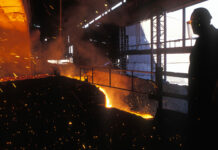
[miningmx.com] — GLOBAL miner Rio Tinto announced on Wednesday a $3.4bn expansion of iron ore mining in Australia, where it has mapped out a plan to lift capacity by more than 50% in anticipation of growing demand from Chinese steel mills.
The world’s second largest iron ore producer said it expects to boost output from its mines in Australia’s western Pilbara iron belt to 283 million tonnes a year by the second half of 2013, up from the current 225 million tonnes.
That would represent about a fifth of current world trade in the key steel making ingredient.
By the end of March, Rio said it expects to lift its operating capacity to 230 million tonnes per year. Only Brazil’s Vale mines more iron ore each year.
“The programme remains on track and we are bringing new iron ore production on stream at a time when demand from Asian markets is forecast to grow strongly, while industry supply growth remains constrained,” Rio Tinto’s iron ore division chief Sam Walsh said in a statement.
Rio said its longer-term plan called for a capacity increase to 353 million tonnes a year by the end of 2015.
Rio Tinto’s share of the increased investment will be $2.9bn, with minority partners shouldering the remaining $500m.
The Pilbara is closer to China, the world’s largest iron-ore consumer, than key sources of high-grade ore in Brazil and Africa, giving Rio an advantage on shipping costs and times.
BHP Billiton , Rio Tinto’s closet rival in Australian iron ore mining, said earlier on Wednesday it was mining at an operating rate of 178 million tonnes a year as it ramps up production in the region.
Iron ore was quoted on Wednesday at $144.70 a tonne, cost and freight delivered to China , near the highest level since November, according to the Steel Index.
BHP Billiton reported its first-half attributable profit slipped to 7 percent to $9.94bn citing lower commodity prices, higher costs, and a slow down in demand from China.
Rio Tinto, reporting on Thursday, is tipped to show a 9% fall in second-half underlying earnings to $7.5bn before one-offs.











